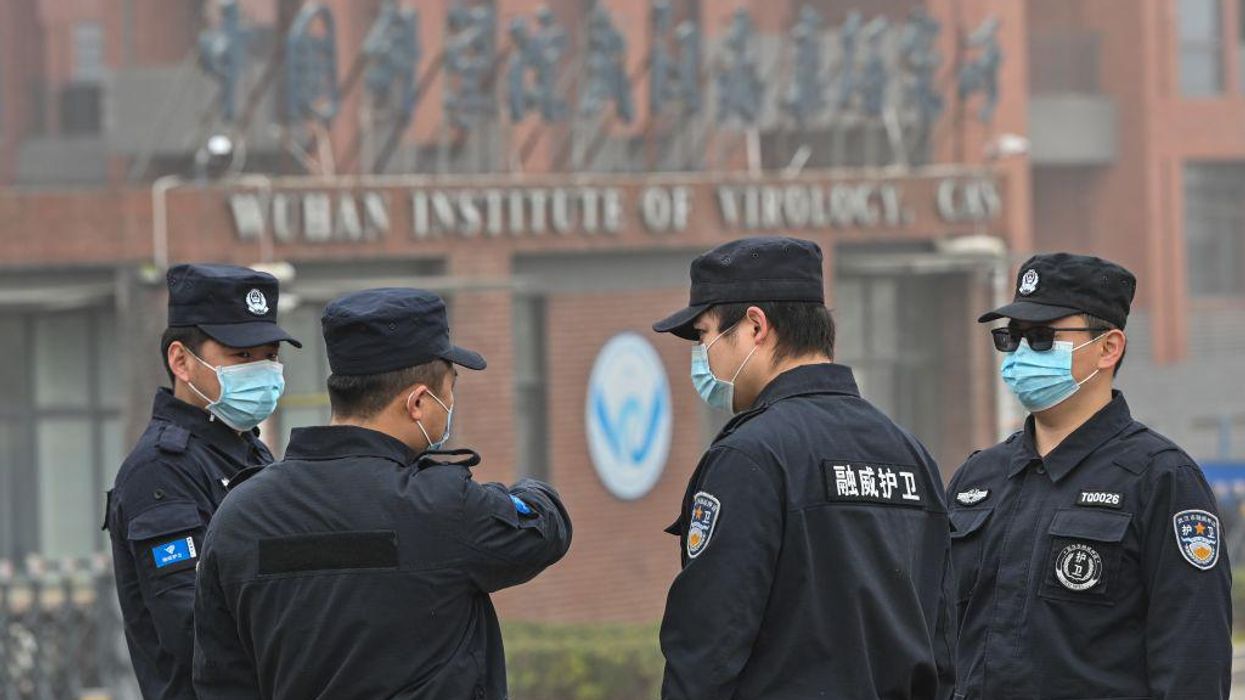
HECTOR RETAMAL/AFP via Getty Images

Following the publication of two letters that asserted the lab-leak theory of the origins of COVID-19 lacked scientific evidence, the Lancet scientific journal has published an "alternative view" from 16 scientists who say there is no direct evidence in support of the natural origins theory and both hypotheses remain plausible.
In this new letter, an international team of health experts called for "objective, open, and transparent scientific debate about the origin of SARS-CoV-2."
"As scientists, we need to evaluate all hypotheses on a rational basis, and to weigh their likelihood based on facts and evidence, devoid of speculation concerning possible political impacts," the authors wrote.
The authors directly challenged the assertions of two letters previously published by the Lancet in which multiple prominent public health scientists said there was no credible evidence supporting the lab-leak theory and that the most likely explanation for the origins of the COVID-19 pandemic was the virus leaping from an animal host to human beings.
The first Lancet letter, published in February 2020, was signed by 27 scientists and "strongly condemned conspiracy theories" that the coronavirus had originated in a Wuhan lab.
"The statement has imparted a silencing effect on the wider scientific debate, including among science journalists," the authors of the new letter wrote.
Indeed, last year social media companies took action to deplatform claims that COVID-19 did not have natural origins, asserting that such claims were "misinformation" that contradicted the "science." The justification for this censorship was based largely on the opinions of the scientists who signed the first Lancet letter.
Emails obtained by U.S. Right to Know revealed that the February 2020 Lancet statement was organized by Peter Daszak, the president of EcoHealth Alliance, a nonprofit group that received federal funding to research bat coronaviruses in partnership with the Wuhan Institute of Virology. That research included gain-of-function experiments, which genetically manipulate viruses to make them more transmissible among mammals, and particularly among humans.
At the time, Daszak did not disclose his close association with the WIV or his potential conflict of interest.
In July 2021, the Lancet published a second letter from 24 of the authors of the first letter in which they doubled-down on their assertion that the lab-leak theory was not supported by scientific evidence.
"In fact, this argument could literally be reversed," the authors of the new letter wrote. "As will be shown below, there is no direct support for the natural origin of SARS-CoV-2, and a laboratory-related accident is plausible."
The new letter poked holes in the claims made by scientists who support the natural origins hypothesis and showed how the assumptions of scientists who dismissed the lab-leak hypothesis were erroneous.
"Based on these indirect and questionable arguments, the authors conclude in favour of a natural proximal origin," the authors wrote.
"Although considerable evidence supports the natural origins of other outbreaks (eg, Nipah, MERS, and the 2002–04 SARS outbreak) direct evidence for a natural origin for SARS-CoV-2 is missing," they said, pointing out that the search for an animal host that transmitted COVID-19 to humans has turned up nothing.
The authors went on to show how evidence suggests "a research-related origin is plausible."
"A research-related contamination could result from contact with a natural virus during field collection, transportation from the field to a laboratory, characterisation of bats and bat viruses in a laboratory, or from a non-natural virus modified in a laboratory," the letter stated.
The authors also noted there are "well-documented cases of pathogen escapes from laboratories."
In conclusion, the authors stated that both the natural origins and lab-leak hypotheses remain plausible, and that is why scientists must be free to debate both ideas without being labeled conspiracy theorists.
"An evidence-based, independent, and prejudice-free evaluation will require an international consultation of high-level experts with no conflicts of interest, from various disciplines and countries; the mandate will be to establish the different scenarios, and the associated hypotheses, and then to propose protocols, methods, and required data in order to elucidate the question of SARS-CoV-2's origin," the authors wrote.
"As shown above, research-related hypotheses are not misinformation and conjecture," they stated. "More importantly, science embraces alternative hypotheses, contradictory arguments, verification, refutability, and controversy. Departing from this principle risks establishing dogmas, abandoning the essence of science, and, even worse, paving the way for conspiracy theories. Instead, the scientific community should bring this debate to a place where it belongs: the columns of scientific journals."